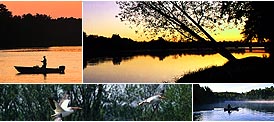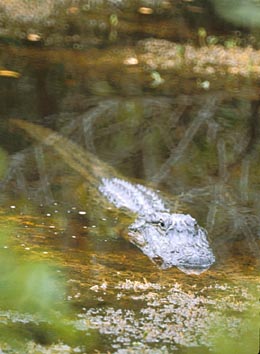
Note: Watch this area for additional navigation information in each section!


West Indian Manatee (Trichechus manatus)
How do you describe a manatee to someone who has never seen one? Their wrinkled, whiskery faces, and big paddle-like tails have led some folks to call them homely. And yet there is an endearing charm to these animals that has fascinated many people who have seen them. The West Indian manatee is a marine mammal that grows to 1,000 pounds and roams U.S. coastal waters from Louisiana to Virginia. Similar to humans, manatees are adapted to the tropics and in winter months must seek warm waters like Florida Bay, where they are often seen by visitors. Manatees pull up and eat the abundant sea grasses and aquatic plants of the bay, consuming 10 to 15 percent of their body weight a day. Their time is divided between eating, resting and playing. They have limited eyesight but good hearing and communicate with one another in squeaks and squeals. Research shows the manatee to be a gentle animal with few enemies. So why are they endangered? Unfortunately, most of their problems are human-related. As our cities expand, their natural habitat is decreased. Added to this problem is the establishment of automatic locks and dams which can harm or kill manatees. But the most critical problem for manatees is boating accidents. They like to rest just below the surface of the water and are often hit by speeding boats. As a result, most manatees in the wild bear prop scars on their backs. For many, the cuts lead to infections which later prove fatal. Broken ribs and punctured lungs resulting from collisions also cause many deaths. In order to limit injuries to manatees, there are many areas marked with signs indicating "NO WAKE ZONE" in Everglades National Park. Boaters must proceed through these zones at idle speed. If everyone helps by slowing down and watching for them, manatees will continue to be sighted in Florida Bay and other parts of Florida in the years to come. If not, they may become extinct. The statewide manatee population is estimated through aerial surveys conducted during the winter months when animals are found in the state's warmer waters. Two interagency, statewide aerial surveys of manatees were conducted in January 2000. The highest count was 2,223 manatees.












